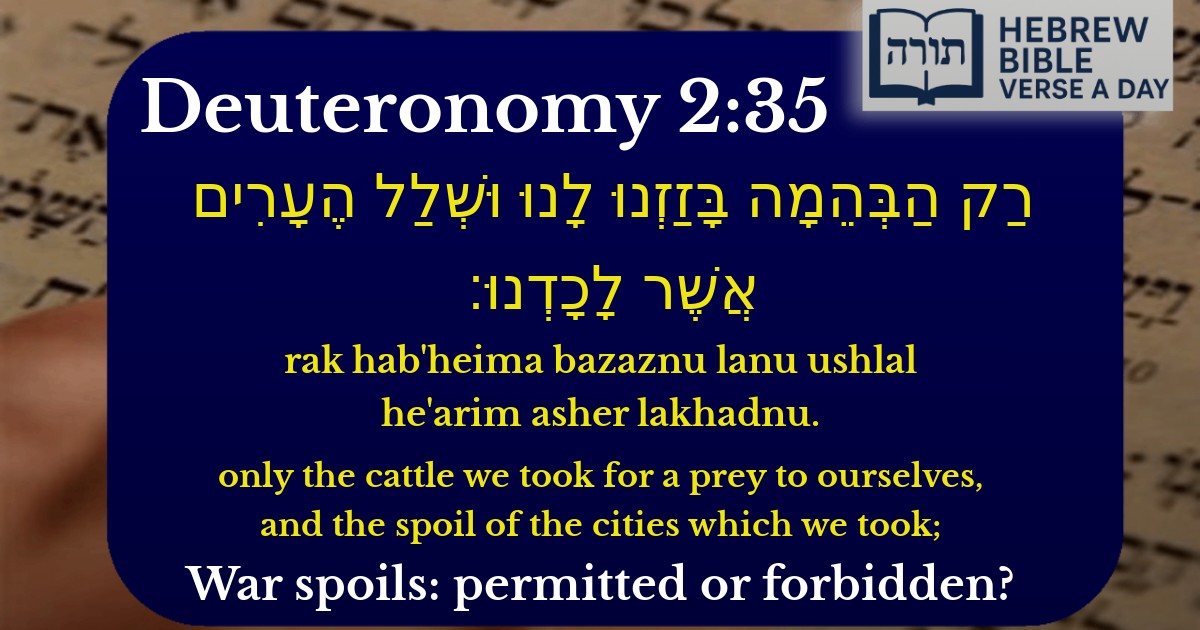Frequently Asked Questions
Q: What does Deuteronomy 2:35 mean when it says 'only the cattle we took for a prey to ourselves'?
A: This verse refers to the spoils of war that the Israelites took after defeating the Emorite kings Sihon and Og. According to Rashi, the phrase emphasizes that they only took the cattle and spoils from the cities they conquered, but did not take any land beyond what was divinely allotted to them (Bamidbar 21:25-26).
Q: Why is Deuteronomy 2:35 important in Jewish tradition?
A: This verse highlights the principle of following divine commandments even in war. The Rambam (Hilchot Melachim 6:1) explains that the Israelites only took what was permitted according to Torah law, showing restraint and obedience to Hashem's instructions regarding warfare and spoils.
Q: What can we learn from Deuteronomy 2:35 today?
A: The verse teaches the importance of ethical conduct even in difficult situations like war. The Talmud (Chullin 17a) derives from such verses that there are boundaries to what one may take, even from enemies. This applies today in business and personal dealings - we must act with integrity within permitted boundaries.
Q: How does Deuteronomy 2:35 relate to the concept of kosher animals?
A: While the verse mentions taking cattle as spoils, the Talmud (Chullin 17a) explains that the Israelites only took animals that were kosher according to Torah law. This shows that even in wartime, they maintained the dietary laws, teaching us that Jewish practices must be observed in all circumstances.
Q: What does 'the spoil of the cities which we took' refer to in Deuteronomy 2:35?
A: According to Ibn Ezra, this refers to the movable property found in the conquered cities. The Midrash (Devarim Rabbah 1:21) explains that this spoil was taken according to the rules of milchemet reshut (permissible war), where spoils are allowed, unlike in milchemet mitzvah (obligatory war) where they are not.


Context in the Torah
The verse (Devarim 2:35) appears in Moshe's recounting of Bnei Yisrael's battles with Sichon and Og, where they were commanded to utterly destroy the enemy but permitted to take spoils of war. This reflects the halachic distinction between obligatory wars (milchemet mitzvah) and discretionary wars (milchemet reshut), as discussed in Rambam's Hilchot Melachim.
Rashi's Commentary
Rashi explains that the phrase "רַק הַבְּהֵמָה" ("only the cattle") teaches that while they were commanded to destroy the people (as per Devarim 20:16-18 regarding the seven Canaanite nations), they were permitted to take the animals and material possessions as spoils. This aligns with the principle that property of idolaters may be appropriated in war, whereas human life follows stricter prohibitions.
Halachic Implications
Moral and Ethical Dimensions
The Kli Yakar highlights that the verse emphasizes "לָנוּ" ("to ourselves")—the spoils were taken collectively for the nation's benefit, not for individual greed. This reflects the ideal that war must be conducted with communal purpose, not personal gain, as later codified in the laws of milchamah.
Midrashic Insight
The Midrash Tanchuma (Chukat 24) connects this episode to the broader theme of divine justice: Sichon and Og had amassed wealth through oppression, so their spoils became a rightful inheritance for Bnei Yisrael as they entered Eretz Yisrael, fulfilling the principle of "מידה כנגד מידה" (measure for measure).